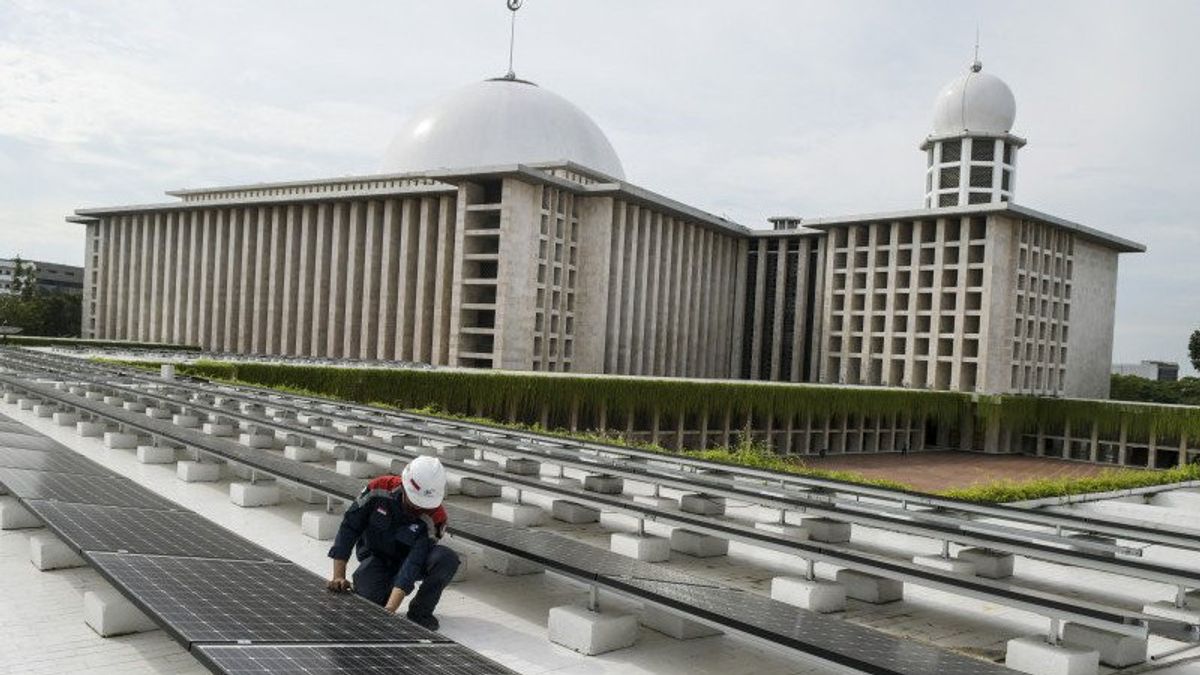JAKARTA - Research Center for Religious Research and Trust, National Research and Innovation Agency (BRIN) Kustini shared the practice of both environmentally friendly mosques to encourage mosques in Indonesia to contribute to the green environment.
Some of the points that are prioritized are water conservation, energy efficiency, waste management, green open space, awareness and environmental education, to environmentally friendly infrastructure.
"The Istiqlal Mosque introduces a low-flux water tap and a water recycling system, which cuts the use of mosque water by 36 percent. This led it to an award as an Excelence in Design for Green Efficiency (EDGE), as well as being the first mosque in the world to become an environmentally friendly house of worship," Kustini said in a discussion that was followed online, Tuesday, October 15, confiscated by Antara.
Kustini continued, the Istiqlal Mosque also has solar panels, where the device is capable of supplying 13 percent of its electricity needs. In addition, the country's mosque also maximizes lighting by maximizing ventilation, which significantly reduces the overall energy consumption of mosques.
Not only at the Istiqlal Mosque which is a state mosque, he also revealed that various good practices are also owned by mosques in the area, one of which is at the Jami' Al-Ilham Mosque, Pati, Central Java, where the mosque houses rainwater and ablution water for the irrigation of rice fields and waqf gardens around the mosque.
"The Jami' Al-Ilham Mosque also uses an energy efficient tap and an automatic lighting system has been installed to reduce water and electricity consumption," he said.
SEE ALSO:
Not only that, said Kustini, the Jami' Al-Ilham Mosque also manages community-based waste banks, which encourage waste disposal and appropriate recycling for the surrounding community.
Furthermore, the same mosque is also equipped with green open space, which helps provide coolness and improve air quality around the location. The same thing is also owned by the Al-Akbar Mosque, Surabaya, which has greenhouses for urban farming practices (urban farming) using modern agricultural techniques such as hydroponics.
"The AI-Akbar mosque also has an edupark that offers nine environmental study destinations, which allow visitors to learn about various plant species and environmentally friendly practices," he explained.
Kustini also revealed the strategic role of women in the management of the mosque, as found in the Suciati Saliman Mosque, Yogyakarta. This mosque was founded by a female entrepreneur in the field of cut chicken, where this mosque received the Anugerah of the Pilot and Friendly Mosque (Ampera) and the International Symposium on Innovative Mosque (ISIM) 2024.
Through these various good practices, he said, it is hoped that the green religion movement or movement that views nature as something sacred and an order from God can begin with the mosque environment.
"Any religion teaches a clean and healthy environment. In the context of a mosque, this must be a joint movement between the community, mass organizations, and the government to create an environmentally friendly mosque," said Kustini.
The English, Chinese, Japanese, Arabic, and French versions are automatically generated by the AI. So there may still be inaccuracies in translating, please always see Indonesian as our main language. (system supported by DigitalSiber.id)



















